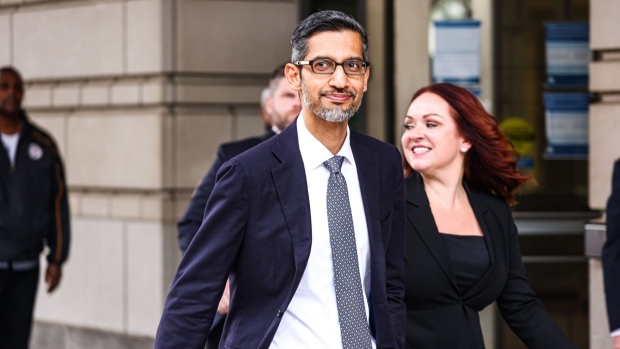Oct 30, 2023
Google’s Pichai Refutes DOJ Allegations of Deleting Evidence
, Bloomberg News

(Bloomberg) -- Google Chief Executive Officer Sundar Pichai sought to defend himself against US government accusations that he has encouraged internal communications to be hidden from enforcers scrutinizing the company for antitrust violations.
Testifying in the landmark Justice Department competition case on Monday, Pichai said he “very rarely” changes settings so that his chat records are deleted after 24 hours. He also acknowledged that he sometimes adds lawyers to his emails to ensure they are treated confidentially — not necessarily because he is seeking legal advice.
“There have been occasions where I’ve just marked things as privileged to indicate it’s confidential,” Pichai said. But in general, if he wants legal advice, he simply adds Google Chief Legal Officer Kent Walker to email chains, he said.
The Justice Department grilled Pichai over Google’s “Communicate with Care” program, under which staff were instructed to copy company lawyers when they didn’t technically need to and encouraged to have sensitive conversations over chat with the history function turned off, meaning the conversation is automatically deleted after 24 hours.
When the company first created its internal chat product, conversations were automatically archived. But in 2008, Walker and other top executives at Google announced a change so that conversations would disappear after 24 hours unless a person changed the archive settings.
“As you know, Google continues to be in the midst of several significant legal and regulatory matters, including government review of our deal with Yahoo!,” Walker said in a September 2008 email to staff shown at the trial. “To help avoid inadvertent retention of instant messages, we have decided to make ‘off the record’ the Google corporate default setting for chats.”
The email noted that any employees on a litigation hold should seek to retain their chats.
Pichai said he received the message, having joined Google in 2004, but wasn’t involved in the decision. When he became CEO in 2015, he didn’t change the policy.
“When I became CEO this is how it worked,” he said, adding that he relies on Walker and Google’s legal teams to draft policies related to litigation and regulatory issues.
Google changed the policy in February of this year after the Justice Department and other antitrust plaintiffs complained that the company was violating its legal obligations to retain all records for use in litigation. In another antitrust case set for trial next month, a California federal judge found Google “adopted a ‘don’t ask, don’t tell’ policy for chat preservation.”
Justice Department attorney Meagan Bellshaw showed Pichai one of his own chats from September 2021 in which he asked for the history to be turned off. A few seconds later, Pichai deleted the request to change the history.
Pichai said the conversation was related to a public event where he was speaking to Google Cloud customers and he had wanted to discuss topics like who might also be speaking at the end and who was moderating panels.
“This is not even close, remotely, to anything covered by this litigation,” he said of the chat. “I take great care to comply with all litigation holds. I never use chat to have substantial discussions on material topics.”
(Updates to include additional information from document.)
©2023 Bloomberg L.P.





